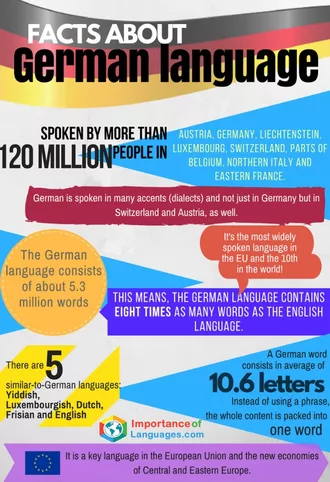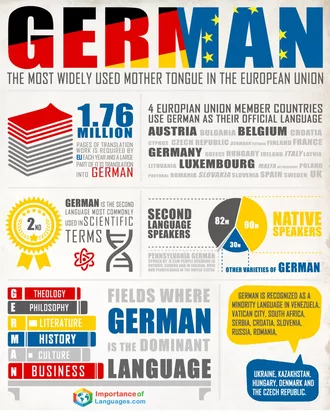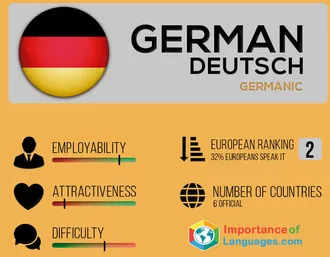Contents
- Why it’s Important to the Learn German Language?
- Why Learn German Video?
- German Language Origin & History
- German Language Today
- 10 Reasons to Learn German
- German is one of the most Spoken Languages in Europe
- German Immigrants influence World Culture
- Some of the Greatest Discoveries Were Done by German Scientists
- Tons of Great Literature And Music in German
- Foreign Business Opportunities with German Businesses
- German’s Importance to the World’s Economy
- Rich Cultural History of German on the World
- Academic Reasons to Learn German
- Learn German as a Hobby/Love of Learning Languages
- German is an Easy Second Language to Learn for English Speakers
- Related
Why it’s Important to the Learn German Language?
The importance of the German language is known by an estimated 140 million across Europe and around the world. German is tied with French as the most learned second language in the European Union. The importance of German as playing a crucial role for centuries in Europe and on the world stage.
Why Learn German Video?
German Language Origin & History
From Gutenberg’s printing press to Hertz’ discovery of electromagnetic waves, from Ehrlich’s development of chemotherapy to Einstein’s theory of relativity, to Brandenburg’s creation of the MP3 digital music format, throughout history, Germans have proven themselves time and again to be great innovators.
In addition to the very wealthy cultural heritage of the German themselves add to the importance of the German language history. With art and architecture spanning centuries ranging from the middle ages to modern times. It’s a shame that Germany receives little tourism though from the Lakes of Mecklenburg-Western Pomerania to the beautiful Bavarian Alps to the beautiful Swiss cities of Bern and Zurich only add and highlight the pure beauty to the landscape of Germany with plenty of theatres, choirs, and Orchestras to go to.
A good amount of the original immigrants to America were German and with them brought many customs and traditions with them to America. Cultural mainstays such as kindergarten, the Christmas tree, hotdogs/hamburgers/ketchup, and founded many breweries as well as Levi jeans and Hershey’s chocolate were introduced by German immigrants to America.
[idea]It is estimated that One out of every four Americans nationwide has German heritage. [/idea]

German Language Today

The importance of the German language in the European Union as the most crucial language to possess in enterprise cause it bridges the particular divide involving the established and emerging financial systems of Central and Eastern Europe.
As a result, knowing German is highly valued in parts of Poland, Hungary, Romania, Russia, Ukraine, the Baltic states and the Czech Republic is a great asset to have. German speakers form the biggest group of potential business partners in the European Union, forming around one-third of the population.
Being in a position to speak the actual language of the target group can be a major factor of influence in successful advertising cause the majority of customers anticipate the service or product to end up being presented within their own language.
Germany and the German language have a wealth of musical talent, literature, architecture and even Scientific and technological advancements.

The demand for German-speakers is highly sought after within the fields associated with:
- Biology
- Chemistry
- Pharmacy
- Engineering
List of German-Speaking Countries
German is the official language in six countries
- Germany
- Austria
- Switzerland
- Liechtenstein
- Belgium (co-official)
- Luxembourg (co-official)
The German Language
German is a West Germanic language as ties to English and Dutch languages and presents some degree of difficulty for English speakers due to its different vocabulary, three-word genders, case system, and rigid syntax.
Although it is quite easy to articulate words however there really are a few difficult ones to understand.
The three genders (Masculine, Neuter or Feminine) is the most demanding part of learning German cause you can’t really predict which gender the word requires. Potentially forgetting them altogether however sad that might be, it usually isn’t an option since sentence structure and vocabulary of the phase depends on the gender.
10 Reasons to Learn German
You probably already have your own reasons to learn German but in case you don’t have one already or still looking for more reasons to get motivated to learn German. This article should help you answer the question “why learn German?”
German is one of the most Spoken Languages in Europe
German is a popular language around Europe as a native language and has a second language. Germany is one of the most populated areas of the European Union.
It is also an official language:
of Austria, Switzerland, Luxembourg, and Liechtenstein. And it is the native language of a significant portion of the population in northern Italy, eastern Belgium, the Netherlands, Denmark, eastern France, parts of Poland, the Czech Republic, Russia, and Romania, as well as in other parts of Europe.
German Immigrants influence World Culture
A good amount of the original immigrants to America were German and with them brought many customs and traditions with them to America. Cultural mainstays such as kindergarten, the Christmas tree, hotdogs/hamburgers/ketchup, and founded many breweries as well as Levi jeans and Hershey’s chocolate were introduced by German immigrants to America. It is estimated that One out of every four Americans nationwide has German heritage.
Some of the Greatest Discoveries Were Done by German Scientists
From Gutenberg’s printing press to Hertz’ discovery of electromagnetic waves, from Ehrlich’s development of chemotherapy to Einstein’s theory of relativity, to Brandenburg’s creation of the MP3 digital music format, throughout history, Germans have proven themselves time and again to be great innovators.
Tons of Great Literature And Music in German
German speakers produce nearly 80,000 new book titles each year. Munich, Germany is second only to New York in the number of new books produced each year and roughly as little as 5% of those are translated into English and other world languages. Most of the world’s famous composers were German.
Foreign Business Opportunities with German Businesses

Knowledge in a second language increases your potential business opportunities.
Businesses planning to break into international markets should understanding that communicating in your target demographic native languages increases confidence and builds trust among both parties.
German’s Importance to the World’s Economy
Germany has the third largest economy in the world and is one of the biggest exporters.

Rich Cultural History of German on the World

Apart from its impact on American culture, Germany has a wealth of history and art of its own. Germany part referred to as “the land of Dichter und Denker” or “the land of poets and thinkers”
Academic Reasons to Learn German
Considering the importance of the German language in the fields of publishing and research, it’s not surprising that many graduate schools want their graduates to have at least a reading knowledge of German.
Knowing German gives graduates access to important research published in German books and professional journals. Many of the world’s governments and agencies have been offering scholarships and other opportunities for individuals who are interested in German studies and learning German.
Learn German as a Hobby/Love of Learning Languages

Maybe you are just one of those people that just enjoy learning languages for the fun of it! Once you’ve mastered the urge to learn more becomes pretty strong. Contrary to popular opinion, not much confusion happens between languages.
German is an Easy Second Language to Learn for English Speakers
![Importance of the German Language Guide [2024] Image Name](https://wwwimportanceoflan7a7fe.zapwp.com/q:i/r:0/wp:1/w:320/u:https://i0.wp.com/www.importanceoflanguages.com/wp-content/uploads/Popular-World-Languages.jpg)
English and German both come from the Germanic language and are pretty similar in vocabulary and grammar. There is a good chance you already understand a little German already.
Meine Schwester hat braunes Haar. Sie ist intelligent. Sie studiert Medizin in Berlin. Sie kann gut singen.
If you understand that with little to no problem then learning German should be no problem for you.
German is truly an amazing language to learn. I hope you find this article helpful in narrowing and strengthening your reasons to learn German.

Interested in a further study into German or confused on where to start? I recommend reading our German Beginners Guide


You forgot to mention in your List of German-Speaking Countries
that in Switzerland German is also a co-official Language.
In fact in Switzerland there are 4 official Languages: German, French, Italian and Raetoromanisch.
And
German is like English a pluricentric language, for the German language in Austria and Switzerland differs quite a bit from German German.
I’m not talking about Swiss German but about the so called Schrift-Deutsch.
Something Germans sometimes don’t or don’t want to see like this.
Hello Wechner – Thanks for the extra info. we will update the website shortly
Is German really Hard Subject?
Thank You for sharing such a nice and informative blog and your knowledge with us.
1. Knowing the language of your German business partners improves your relations and therefore your chances for effective communication and success.
2. Knowledge of German increases your job opportunities with German and foreign companies in your own country and abroad. Proficiency in German helps you to function productively for an employer with global business connections.
3. Tourists from German-speaking countries travel wide and far, and are the world’s biggest spenders when on holiday. They appreciate to be looked after by German-speaking staff and tour guides.
4. German is the second most commonly used scientific language. Germany is the third largest contributor to research and development and offers research fellowships to scientist from abroad.
5. Developments in media, information and communication technology require multilingual communicators. A wide range of important websites are in German and worldwide, Germany is ranked number 5 in terms of annual publication of new books. Knowledge of German therefore offers you extended access to information.
6. Learning German provides you with an insight into the way of life, and the hopes and dreams of people in German speaking countries, broadening your horizon.
7. Make the most of your travels not only in German-speaking countries, but in many other European countries where German is widely spoken, especially in Eastern Europe.
8. German is the language of Goethe, Kafka, Mozart, Bach and Beethoven. Indulge in reading and/or listening to their works in their original language.
9. Germany awards a generous number of scholarships and other support to study in Germany. Working holiday visas are available for young foreigners from a range of countries, and special visas are offered to skilled workers and professionals.
10. A wide range of exchange programs exists for both school and university students between Germany and many countries in the world.
Thank you so very much for your article. This is really good information. It’s great to visit your blog. It really gives me some insight into this subject.